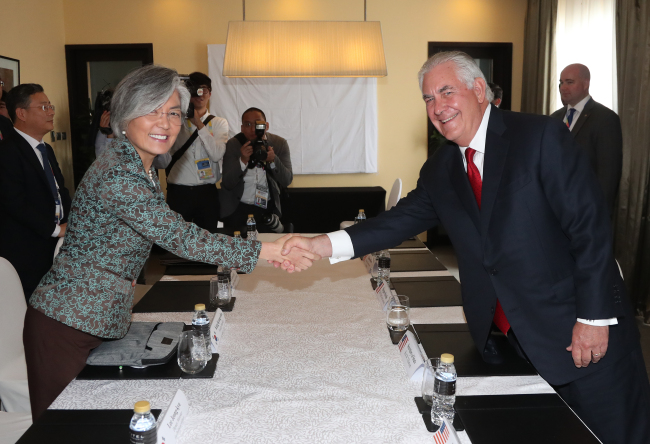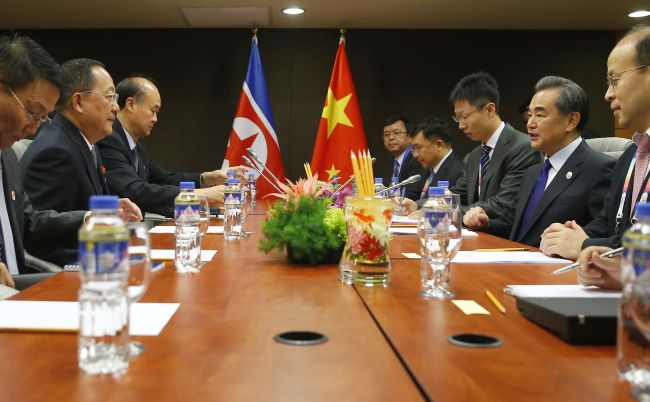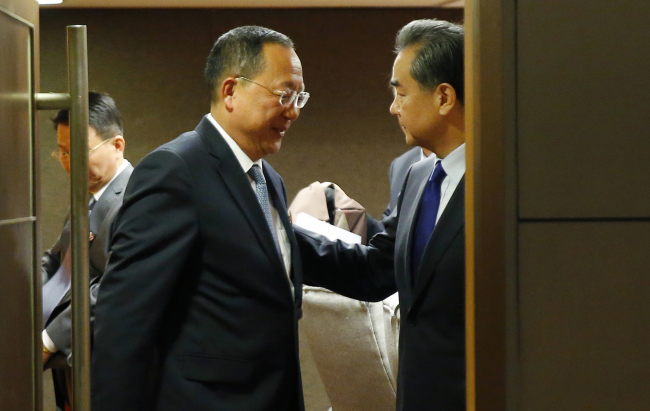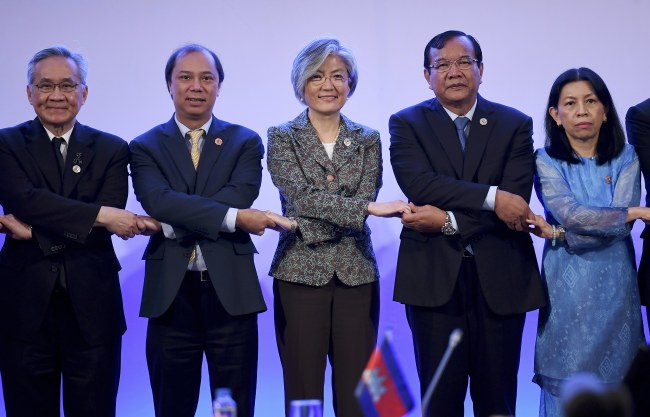MANILA -- Bolstered by a new UN resolution, the foreign ministers of South Korea and the US on Sunday vowed to ensure a tighter enforcement of the sanctions and further step up pressure to dissuade North Korea from its nuclear and missile development.
Kang Kyung-wha and Rex Tillerson held talks ahead of the ASEAN Regional Forum scheduled to kick off Monday in Manila, lauding the resolution adopted Saturday at the UN Security Council as a “good outcome.”
Resolution 2371, triggered by North Korea’s tests of intercontinental ballistic missiles on July 4 and 28, is designed to cut the country’s annual export revenues by about a third, or $1 billion, through a trade ban on coal and other resources, fisheries, labor and others.
 |
Kang Kyung-hwa shakes hands with Rex Tillerson (Yonhap) |
“Tillerson appeared extremely satisfied with the resolution. Its content itself is very important and it would have a substantive impact, and we talked a lot about the cooperation of China and Russia during the process,” Kang told reporters after the 35-minute session.
A senior official at Seoul’s Foreign Ministry who was present at the meeting said that the secretary emphasized the significance of a thorough enforcement of the sanctions, and a greater security partnership not only between the allies but also together with Japan.
“Tillerson said the latest resolution would serve as a strong tool for the US’ global pressure campaign, and it would persistently work to drive China’s resolve for enforcement,” the official said, quoting him as saying “action speaks louder than words.”
Susan Thornton, acting assistant secretary of state for East Asian and Pacific affairs, also said there has been a pattern in which China complies with sanctions after a North Korean provocation, only to loosen it over time. With the new resolution, there would be “not this kind of episodic back and forth that we’ve seen,” she told reporters.
 |
North Korean Foreign Minister Ri Yong Ho, second from left, prepares for a meeting with his Chinese counterpart Wang Yi, second from right, in the sidelines of the 50th ASEAN Foreign Ministers' Meeting and its Dialogue Partners. (AP-Yonhap) |
The two ministers also held separate meetings with Chinese Foreign Minister Wang Yi later in the day and will meet once again Monday for a tripartite gathering involving new Japanese Foreign Minister Taro Kono.
Even before the conference was formally under way, many of the 27 member countries were seen raising their voices against Pyongyang especially over the ICBM launches.
On Saturday, the 10 ministers from the Association of Southeast Asian Nations issued a rare statement on the tests, saying such acts “seriously threaten peace, security and stability in the region and the world” and urging the North’s “full compliance” with UNSC resolutions.
In an apparent bid to appease its headstrong ally after joining the resolution, China invited North Korea for a bilateral ministerial meeting. Wang and Ri Yong-ho held dialogue for about one hour, diplomatic sources here said.
Calling the two countries “close neighbors,” Wang told Ri to look at the latest UNSC resolution “in a coolheaded manner” and warned against additional missile provocations, Chinese state media reported.
 |
Ri Yong-ho, left, and Wang Yi (AP-Yonhap) |
Pang Kwang-hyok, a deputy director-general at the Foreign Ministry’s international organization bureau who is accompanying Ri, said after the session that the two ministers “exchanged views on the regional political situation and bilateral affairs.”
At a separate meeting with reporters before the talks, Wang reiterated the need to reopen the stalled six-party denuclearization forum, saying dialogue is vital to easing tension and a peaceful resolution of the standoff.
“After the implementation of the resolutions, the Korean Peninsula issue enters into a critical juncture,” he was quoted as saying by Reuters.
“We cannot do one and neglect the other. Sanctions are needed but sanctions are not the final goal. … This is currently the most realistic and plausible initiative and it is the most reasonable and friendly solution.”
On the inter-Korean front, the forum would make way for a first-ever encounter between Kang and Ri though the possibility for meaningful talks appeared unlikely.
Touching down in the Manila airport on Saturday, Kang said she would speak with Ri when a “natural chance” comes.
“It would be great if I could convey that (North Korea) ought to halt provocations and positively respond to our recent two proposals with regard to building a peace regime,” she told reporters, referring to Seoul’s offer of military and humanitarian talks last month.
 |
The ASEAN delegates (EPA-Yonhap) |
But Pang expressed skepticism toward a potential meeting between the two ministers, while Ri continued to evade repeated questions from the press.
“There will be no dialogue,” Pak told reporters Sunday when asked if Ri was planning talks with Kang.
The trip marked Kang’s solo debut on the world stage as the country’s top diplomat. She is slated for a string of ASEAN-related ministerial conferences and bilateral talks with more than a dozen of her counterparts on the sidelines, also including Southeast Asian nations, Australia, Canada and New Zealand.
The 27 ministers are to adopt a chairman’s statement as early as Tuesday, which will address issues from the North’s nuclear and missile programs to territorial rows in the South China Sea.
In a draft seen Sunday by The Korea Herald, the ministers displayed “grave concern” over Pyongyang’s ICBM tests which resulted in an “escalation of tensions” in the region.
“They urged the DPRK (North Korea) to immediately comply fully with its obligations under relevant UN Security Council resolutions and stressed the importance of exercising self-restraint in the interest of maintaining peace, security and stability in the region and the world,” the text reads. “They urged all concerned parties to allow space for the resumption of dialogue.”
By Shin Hyon-hee / Korea Herald Correspondent (
heeshin@heraldcorp.com)










![[Today’s K-pop] Blackpink’s Jennie, Lisa invited to Coachella as solo acts](http://res.heraldm.com/phpwas/restmb_idxmake.php?idx=644&simg=/content/image/2024/11/21/20241121050099_0.jpg)
